<< Previous | Displaying results 71-80 of 571 for "" | Next >>
-
Kurt Klein describes some of the difficulties involved in emigrating from Germany
Oral HistoryAs Nazi anti-Jewish policy intensified, Kurt's family decided to leave Germany. Kurt left for the United States in 1937, but his parents were unable to leave before the outbreak of World War II. Kurt's parents were eventually deported to Auschwitz, in German-occupied Poland. In 1942, Kurt joined the United States Army and was trained in military intelligence. In Europe, he interrogated prisoners of war. In May 1945, he took part in the surrender of a village in Czechoslovakia and returned the next day to…
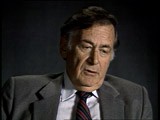
-
Norbert Wollheim describes his experiences on a transport during deportation from Berlin
Oral HistoryNorbert studied law and was a social worker in Berlin. He worked on the Kindertransport (Children's Transport) program, arranging to send Jewish children from Europe to Great Britain. His parents, who also lived in Berlin, were deported in December 1942. Norbert, his wife, and their child were deported to Auschwitz in March 1943. He was separated from his wife and child, and sent to the Buna works near Auschwitz III (Monowitz) for forced labor. Norbert survived the Auschwitz camp, and was liberated by US…
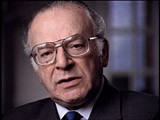
-
Miriam Lewent describes deportation to a village near Tomsk, Siberia
Oral HistoryMiriam and her family fled their home when the Germans invaded Poland in 1939. They were interned by Soviet forces and deported to Siberia. Near the city of Tomsk, Miriam cut trees to earn food rations. When the Soviet Union went to war with Germany in June 1941, the Soviets released Miriam and her family. They sold their Red Cross rations for train fare and intended to return to Poland, but most of the family settled in Kazakhstan during the rest of the war. There, her father taught Hebrew to Jewish…
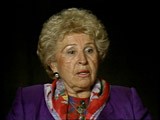
-
Miriam Lewent describes conditions in Siberia
Oral HistoryMiriam and her family fled their home when the Germans invaded Poland in 1939. They were interned by Soviet forces and deported to Siberia. Near the city of Tomsk, Miriam cut trees to earn food rations. When the Soviet Union went to war with Germany in June 1941, the Soviets released Miriam and her family. They sold their Red Cross rations for train fare and intended to return to Poland, but most of the family settled in Kazakhstan during the rest of the war. There, her father taught Hebrew to Jewish…
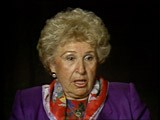
-
Wallace Witkowski describes harsh living conditions for non-Jews in Poland
Oral HistoryWallace and his family were Polish Catholics. His father was a chemical engineer and his mother a teacher. The Germans occupied Kielce in 1939. Wallace witnessed pogroms against Jews in 1942. Wallace was active in the anti-Nazi resistance, acting as a courier between partisan groups. In 1946, in liberated Poland, Wallace witnessed the Kielce pogrom. He was reunited with his father in the United States in 1949; other family members followed. The Communist regime in Poland, however, denied his only sister…
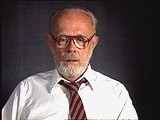
-
Miso (Michael) Vogel describes the brutality of SS guards towards new arrivals at Auschwitz
Oral HistoryIn 1939, Slovak fascists took over Topol'cany, where Miso lived. In 1942, Miso was deported to the Slovak-run Novaky camp and then to Auschwitz. At Auschwitz, he was tattooed with the number 65,316, indicating that 65,315 prisoners preceded him in that series of numbering. He was forced to labor in the Buna works and then in the Birkenau "Kanada" detachment, unloading incoming trains. In late 1944, prisoners were transferred to camps in Germany. Miso escaped during a death march from Landsberg and was…
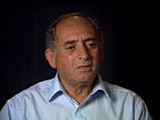
-
Sam Itzkowitz describes forced labor in the gravel pits of Auschwitz
Oral HistoryThe Germans invaded Poland in September 1939. When Makow was occupied, Sam fled to Soviet territory. He returned to Makow for provisions, but was forced to remain in the ghetto. In 1942, he was deported to Auschwitz. As the Soviet army advanced in 1944, Sam and other prisoners were sent to camps in Germany. The inmates were put on a death march early in 1945. American forces liberated Sam after he escaped during a bombing raid.
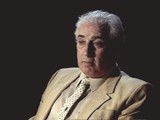
-
Ernest Koenig describes forced labor in the Laurahuette subcamp of the Auschwitz camp
Oral HistoryErnest was studying in Paris, France, until February 1939, when he returned to Brno, Czechoslovakia. The Germans occupied the latter region soon thereafter, but Ernest managed to return to France. He joined a Czech unit in the French army from October 1939 until the fall of France in May 1940. He made his way to unoccupied France, where he taught for a while. He then went to Grenoble, and again taught, but was arrested because he did not have the appropriate papers. Ernest was interned in Le Vernet camp…
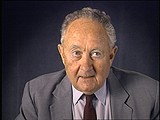
-
Ernest Koenig describes reaching the verge of death while in a subcamp of Auschwitz
Oral HistoryErnest was studying in Paris, France, until February 1939, when he returned to Brno, Czechoslovakia. The Germans occupied the latter region soon thereafter, but Ernest managed to return to France. He joined a Czech unit in the French army from October 1939 until the fall of France in May 1940. He made his way to unoccupied France, where he taught for a while. He then went to Grenoble, and again taught, but was arrested because he did not have the appropriate papers. Ernest was interned in Le Vernet camp…
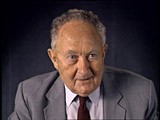
-
Beatrice Stern Pappenheimer recalls leaving Gurs and receiving assistance from the Children's Aid Society (OSE)
Oral HistoryBeatrice's family lost their textile business and home when the Nazis barred Jews from owning property. The family was deported to camps. Beatrice, her sister, and their mother were sent to Gurs. The Children's Aid Society (OSE) later placed the girls in homes and convents, where they feared Allied bomb attacks, but escaped the horrors of camp life. Their parents perished.

